Research Proposal on Auditing and Organisational Effectiveness (MBA)
VerifiedAdded on 2022/12/29
|41
|11514
|413
Project
AI Summary
This research proposal investigates the crucial role of auditing in enhancing organisational effectiveness. It begins with an abstract and introduction, outlining the aims and objectives of the research, which include understanding the conceptual framework of auditing, exploring auditor functions, and identifying challenges faced by auditors and their solutions. The proposal includes a literature review covering key concepts, such as the conceptual framework of auditing, the need for auditing, and the functions of auditors. It also addresses the challenges faced by auditors and proposes solutions. The methodology section details the research approach, design, and methods, including data collection and ethical considerations. The proposal aims to provide a comprehensive analysis of how auditing impacts organisational performance and offers insights for improving effectiveness. The structure includes abstract, introduction, aims, objectives, literature review, methodology, data analysis, conclusion, recommendations, references, and appendices.
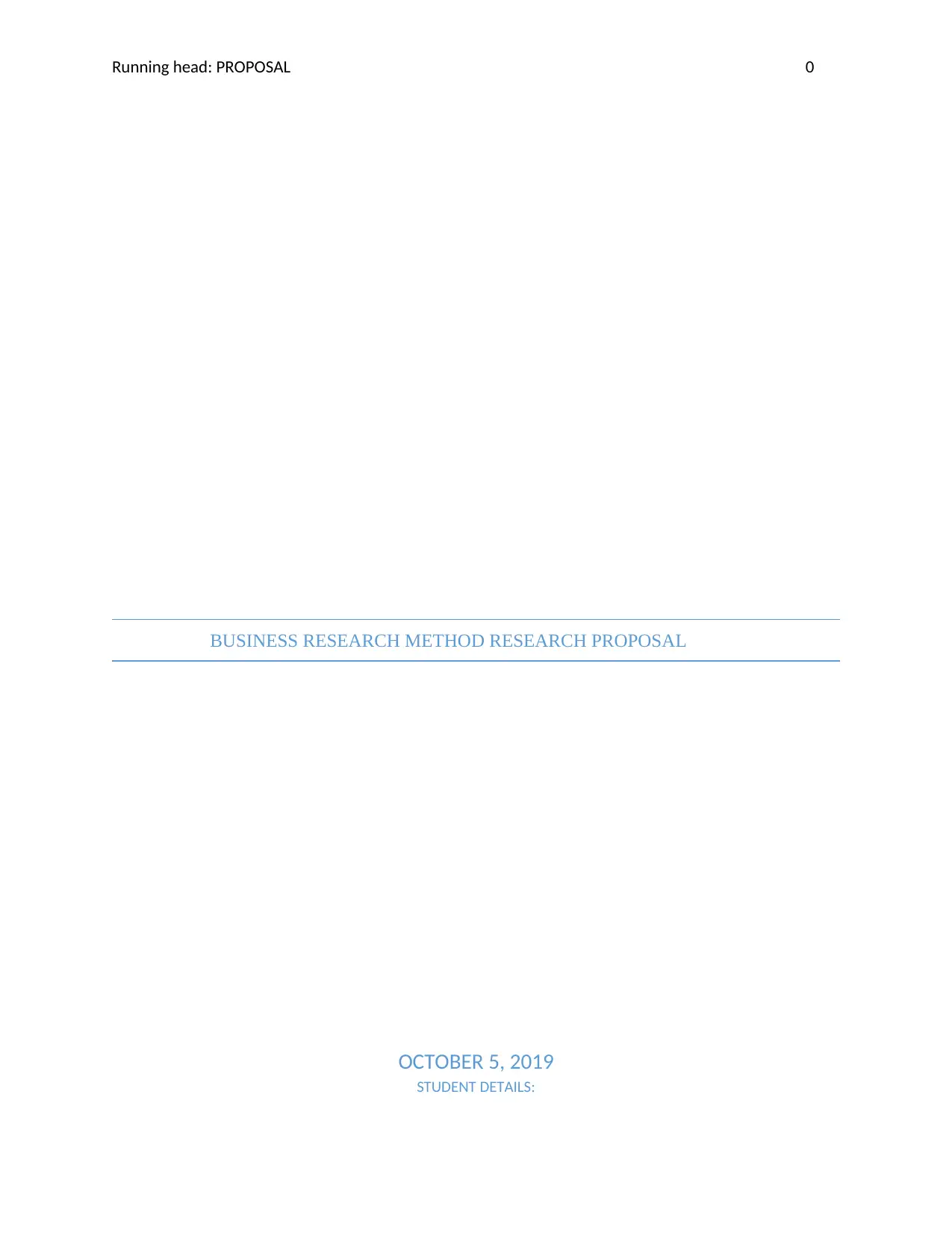
Running head: PROPOSAL 0
BUSINESS RESEARCH METHOD RESEARCH PROPOSAL
OCTOBER 5, 2019
STUDENT DETAILS:
BUSINESS RESEARCH METHOD RESEARCH PROPOSAL
OCTOBER 5, 2019
STUDENT DETAILS:
Paraphrase This Document
Need a fresh take? Get an instant paraphrase of this document with our AI Paraphraser
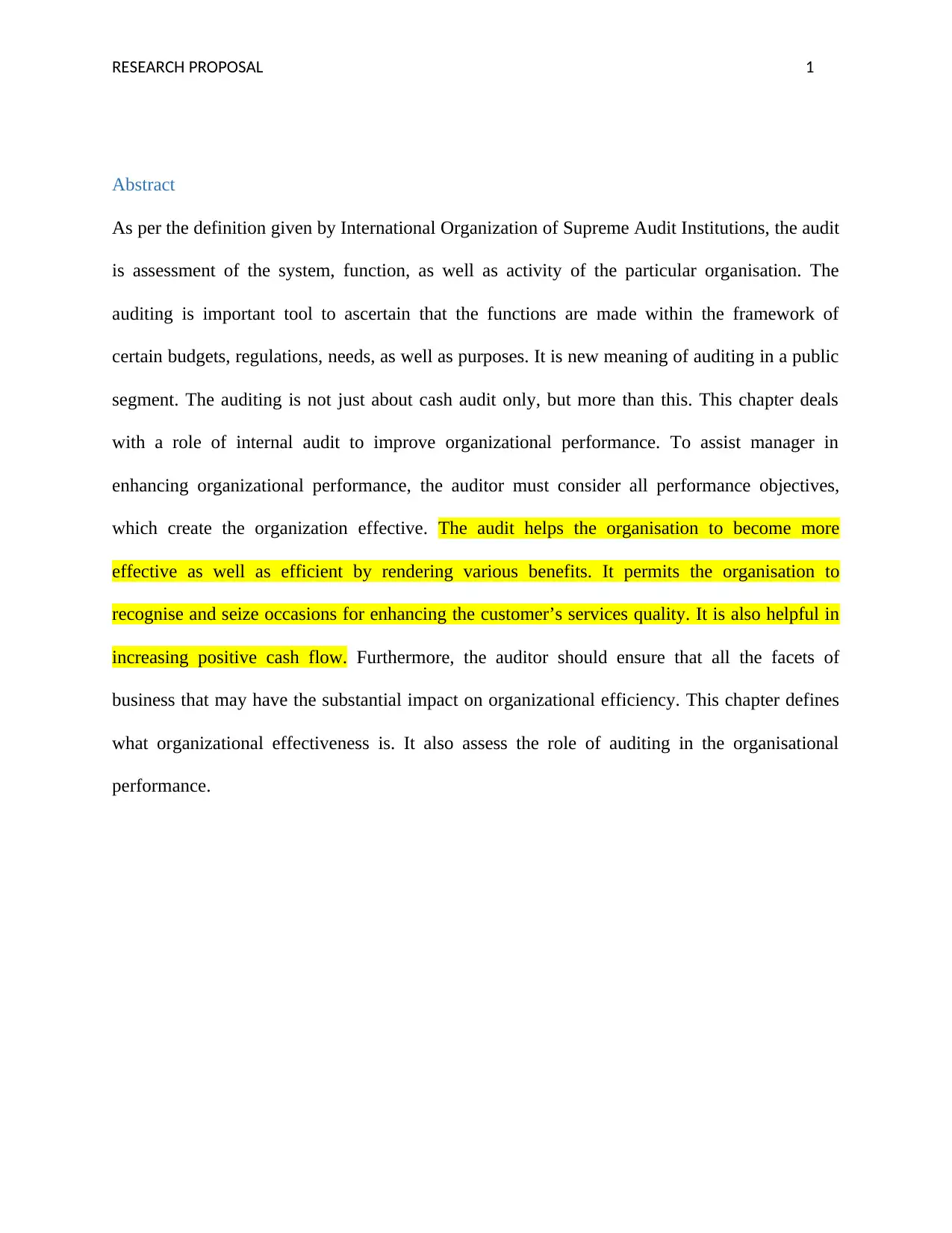
RESEARCH PROPOSAL 1
Abstract
As per the definition given by International Organization of Supreme Audit Institutions, the audit
is assessment of the system, function, as well as activity of the particular organisation. The
auditing is important tool to ascertain that the functions are made within the framework of
certain budgets, regulations, needs, as well as purposes. It is new meaning of auditing in a public
segment. The auditing is not just about cash audit only, but more than this. This chapter deals
with a role of internal audit to improve organizational performance. To assist manager in
enhancing organizational performance, the auditor must consider all performance objectives,
which create the organization effective. The audit helps the organisation to become more
effective as well as efficient by rendering various benefits. It permits the organisation to
recognise and seize occasions for enhancing the customer’s services quality. It is also helpful in
increasing positive cash flow. Furthermore, the auditor should ensure that all the facets of
business that may have the substantial impact on organizational efficiency. This chapter defines
what organizational effectiveness is. It also assess the role of auditing in the organisational
performance.
Abstract
As per the definition given by International Organization of Supreme Audit Institutions, the audit
is assessment of the system, function, as well as activity of the particular organisation. The
auditing is important tool to ascertain that the functions are made within the framework of
certain budgets, regulations, needs, as well as purposes. It is new meaning of auditing in a public
segment. The auditing is not just about cash audit only, but more than this. This chapter deals
with a role of internal audit to improve organizational performance. To assist manager in
enhancing organizational performance, the auditor must consider all performance objectives,
which create the organization effective. The audit helps the organisation to become more
effective as well as efficient by rendering various benefits. It permits the organisation to
recognise and seize occasions for enhancing the customer’s services quality. It is also helpful in
increasing positive cash flow. Furthermore, the auditor should ensure that all the facets of
business that may have the substantial impact on organizational efficiency. This chapter defines
what organizational effectiveness is. It also assess the role of auditing in the organisational
performance.
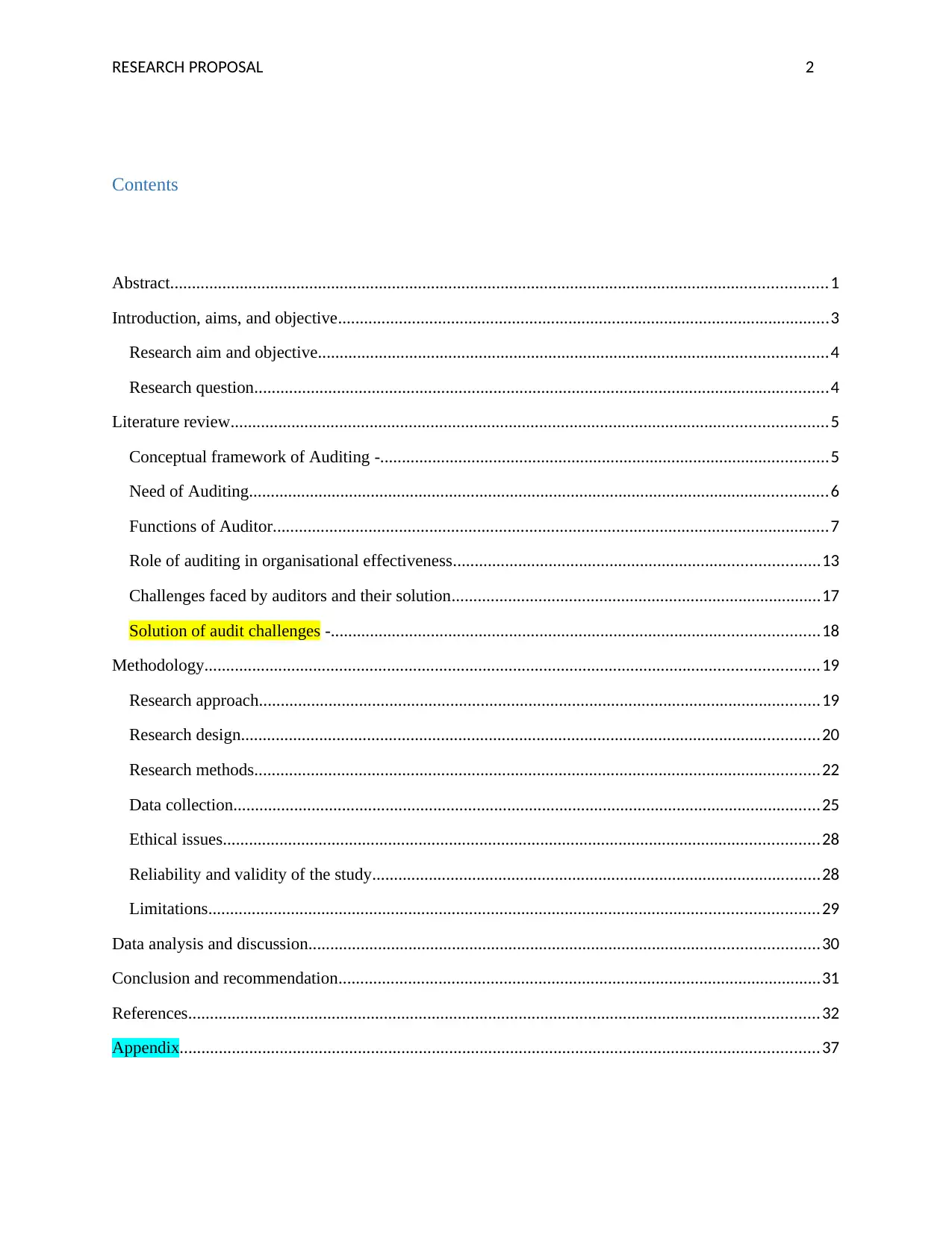
RESEARCH PROPOSAL 2
Contents
Abstract.......................................................................................................................................................1
Introduction, aims, and objective.................................................................................................................3
Research aim and objective.....................................................................................................................4
Research question....................................................................................................................................4
Literature review.........................................................................................................................................5
Conceptual framework of Auditing -.......................................................................................................5
Need of Auditing.....................................................................................................................................6
Functions of Auditor................................................................................................................................7
Role of auditing in organisational effectiveness....................................................................................13
Challenges faced by auditors and their solution.....................................................................................17
Solution of audit challenges -................................................................................................................18
Methodology.............................................................................................................................................19
Research approach.................................................................................................................................19
Research design.....................................................................................................................................20
Research methods..................................................................................................................................22
Data collection.......................................................................................................................................25
Ethical issues.........................................................................................................................................28
Reliability and validity of the study.......................................................................................................28
Limitations............................................................................................................................................29
Data analysis and discussion.....................................................................................................................30
Conclusion and recommendation...............................................................................................................31
References.................................................................................................................................................32
Appendix...................................................................................................................................................37
Contents
Abstract.......................................................................................................................................................1
Introduction, aims, and objective.................................................................................................................3
Research aim and objective.....................................................................................................................4
Research question....................................................................................................................................4
Literature review.........................................................................................................................................5
Conceptual framework of Auditing -.......................................................................................................5
Need of Auditing.....................................................................................................................................6
Functions of Auditor................................................................................................................................7
Role of auditing in organisational effectiveness....................................................................................13
Challenges faced by auditors and their solution.....................................................................................17
Solution of audit challenges -................................................................................................................18
Methodology.............................................................................................................................................19
Research approach.................................................................................................................................19
Research design.....................................................................................................................................20
Research methods..................................................................................................................................22
Data collection.......................................................................................................................................25
Ethical issues.........................................................................................................................................28
Reliability and validity of the study.......................................................................................................28
Limitations............................................................................................................................................29
Data analysis and discussion.....................................................................................................................30
Conclusion and recommendation...............................................................................................................31
References.................................................................................................................................................32
Appendix...................................................................................................................................................37
⊘ This is a preview!⊘
Do you want full access?
Subscribe today to unlock all pages.

Trusted by 1+ million students worldwide
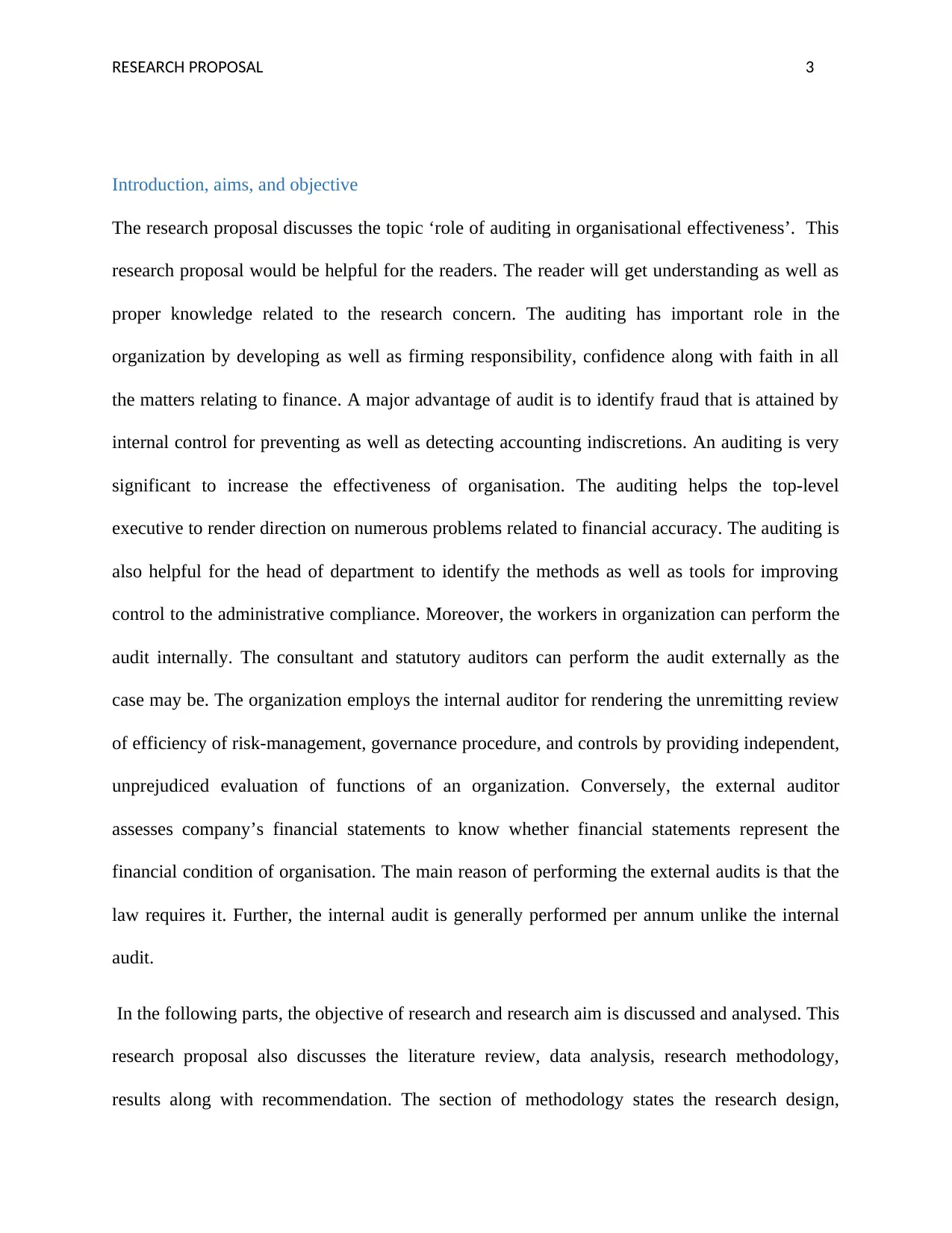
RESEARCH PROPOSAL 3
Introduction, aims, and objective
The research proposal discusses the topic ‘role of auditing in organisational effectiveness’. This
research proposal would be helpful for the readers. The reader will get understanding as well as
proper knowledge related to the research concern. The auditing has important role in the
organization by developing as well as firming responsibility, confidence along with faith in all
the matters relating to finance. A major advantage of audit is to identify fraud that is attained by
internal control for preventing as well as detecting accounting indiscretions. An auditing is very
significant to increase the effectiveness of organisation. The auditing helps the top-level
executive to render direction on numerous problems related to financial accuracy. The auditing is
also helpful for the head of department to identify the methods as well as tools for improving
control to the administrative compliance. Moreover, the workers in organization can perform the
audit internally. The consultant and statutory auditors can perform the audit externally as the
case may be. The organization employs the internal auditor for rendering the unremitting review
of efficiency of risk-management, governance procedure, and controls by providing independent,
unprejudiced evaluation of functions of an organization. Conversely, the external auditor
assesses company’s financial statements to know whether financial statements represent the
financial condition of organisation. The main reason of performing the external audits is that the
law requires it. Further, the internal audit is generally performed per annum unlike the internal
audit.
In the following parts, the objective of research and research aim is discussed and analysed. This
research proposal also discusses the literature review, data analysis, research methodology,
results along with recommendation. The section of methodology states the research design,
Introduction, aims, and objective
The research proposal discusses the topic ‘role of auditing in organisational effectiveness’. This
research proposal would be helpful for the readers. The reader will get understanding as well as
proper knowledge related to the research concern. The auditing has important role in the
organization by developing as well as firming responsibility, confidence along with faith in all
the matters relating to finance. A major advantage of audit is to identify fraud that is attained by
internal control for preventing as well as detecting accounting indiscretions. An auditing is very
significant to increase the effectiveness of organisation. The auditing helps the top-level
executive to render direction on numerous problems related to financial accuracy. The auditing is
also helpful for the head of department to identify the methods as well as tools for improving
control to the administrative compliance. Moreover, the workers in organization can perform the
audit internally. The consultant and statutory auditors can perform the audit externally as the
case may be. The organization employs the internal auditor for rendering the unremitting review
of efficiency of risk-management, governance procedure, and controls by providing independent,
unprejudiced evaluation of functions of an organization. Conversely, the external auditor
assesses company’s financial statements to know whether financial statements represent the
financial condition of organisation. The main reason of performing the external audits is that the
law requires it. Further, the internal audit is generally performed per annum unlike the internal
audit.
In the following parts, the objective of research and research aim is discussed and analysed. This
research proposal also discusses the literature review, data analysis, research methodology,
results along with recommendation. The section of methodology states the research design,
Paraphrase This Document
Need a fresh take? Get an instant paraphrase of this document with our AI Paraphraser
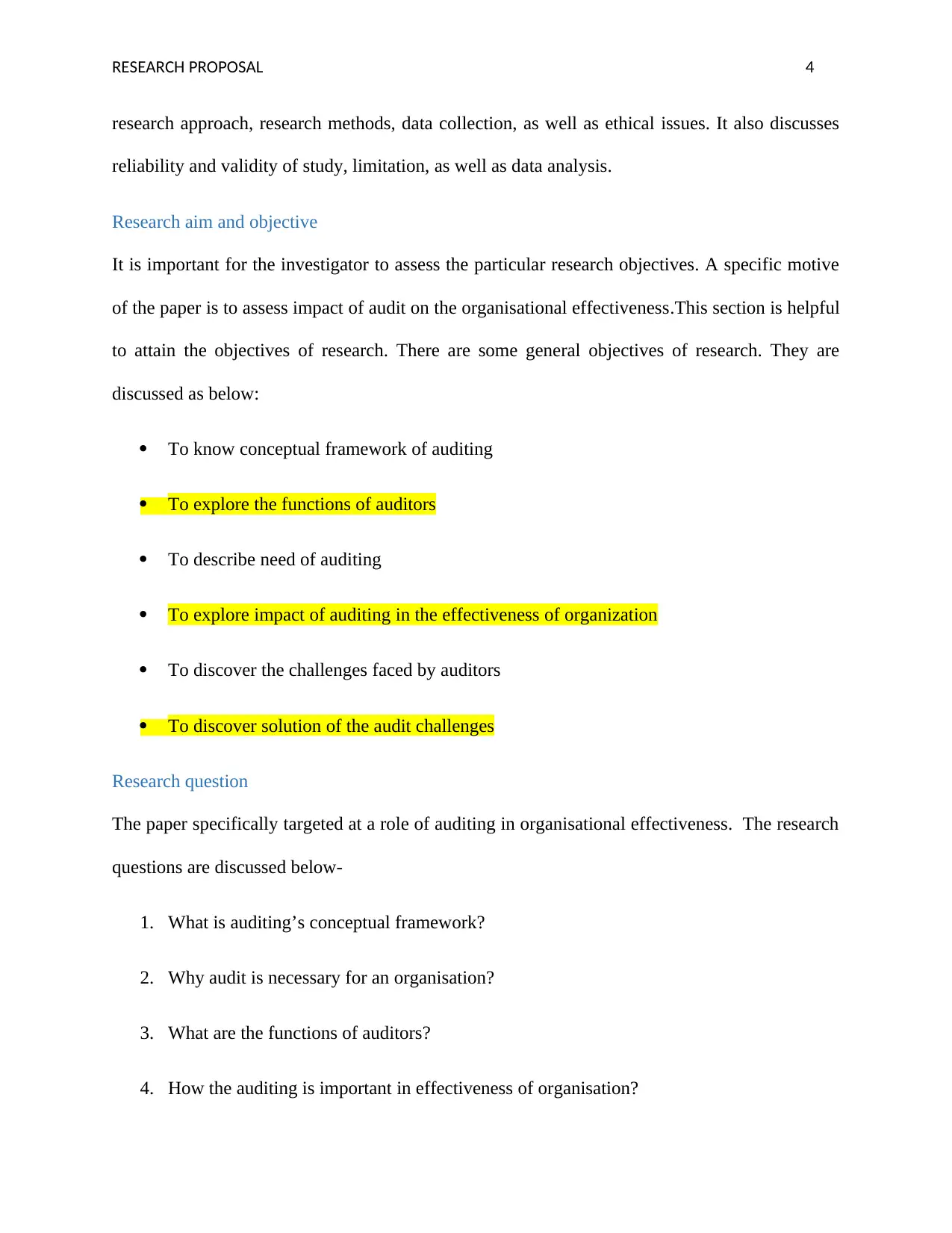
RESEARCH PROPOSAL 4
research approach, research methods, data collection, as well as ethical issues. It also discusses
reliability and validity of study, limitation, as well as data analysis.
Research aim and objective
It is important for the investigator to assess the particular research objectives. A specific motive
of the paper is to assess impact of audit on the organisational effectiveness.This section is helpful
to attain the objectives of research. There are some general objectives of research. They are
discussed as below:
To know conceptual framework of auditing
To explore the functions of auditors
To describe need of auditing
To explore impact of auditing in the effectiveness of organization
To discover the challenges faced by auditors
To discover solution of the audit challenges
Research question
The paper specifically targeted at a role of auditing in organisational effectiveness. The research
questions are discussed below-
1. What is auditing’s conceptual framework?
2. Why audit is necessary for an organisation?
3. What are the functions of auditors?
4. How the auditing is important in effectiveness of organisation?
research approach, research methods, data collection, as well as ethical issues. It also discusses
reliability and validity of study, limitation, as well as data analysis.
Research aim and objective
It is important for the investigator to assess the particular research objectives. A specific motive
of the paper is to assess impact of audit on the organisational effectiveness.This section is helpful
to attain the objectives of research. There are some general objectives of research. They are
discussed as below:
To know conceptual framework of auditing
To explore the functions of auditors
To describe need of auditing
To explore impact of auditing in the effectiveness of organization
To discover the challenges faced by auditors
To discover solution of the audit challenges
Research question
The paper specifically targeted at a role of auditing in organisational effectiveness. The research
questions are discussed below-
1. What is auditing’s conceptual framework?
2. Why audit is necessary for an organisation?
3. What are the functions of auditors?
4. How the auditing is important in effectiveness of organisation?
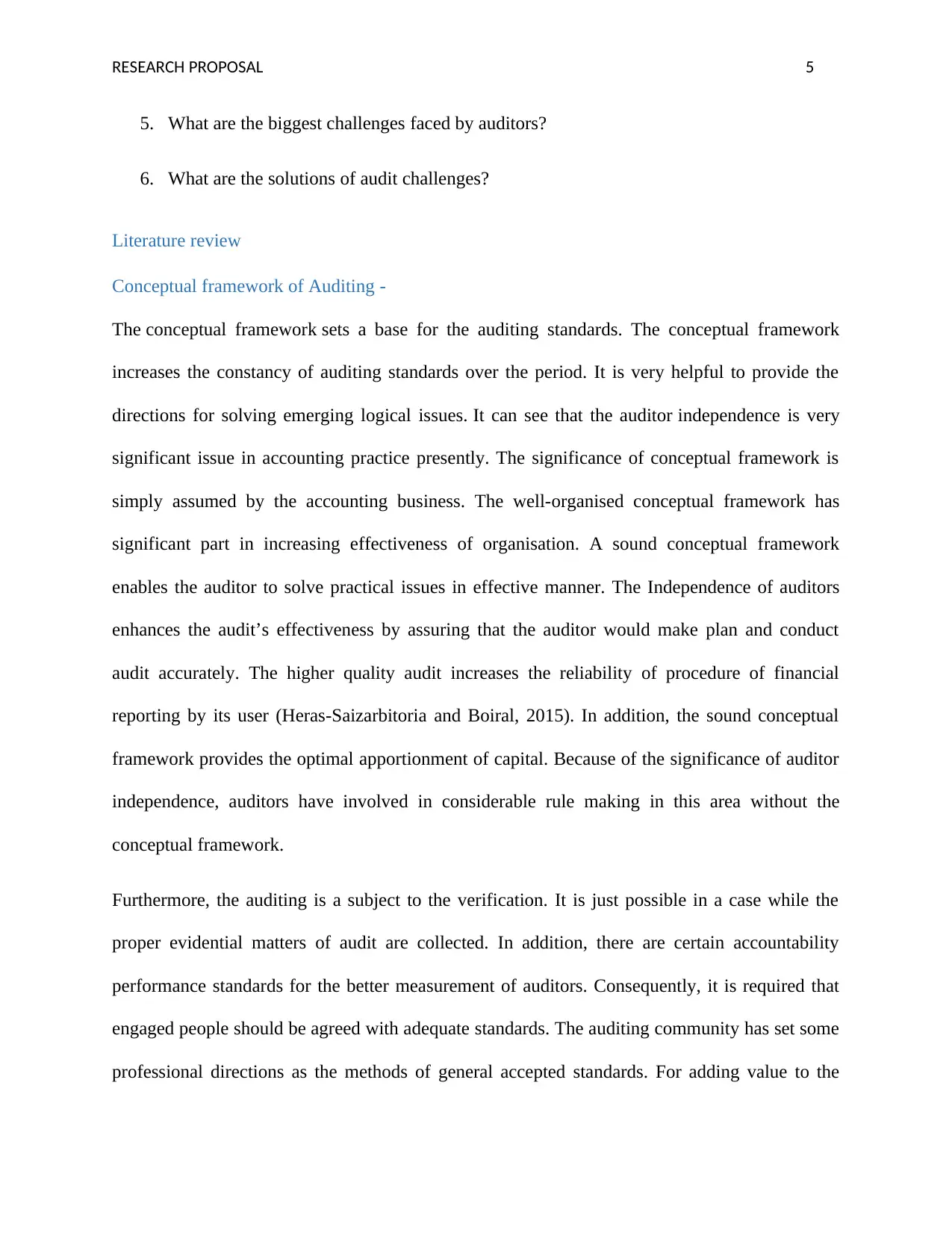
RESEARCH PROPOSAL 5
5. What are the biggest challenges faced by auditors?
6. What are the solutions of audit challenges?
Literature review
Conceptual framework of Auditing -
The conceptual framework sets a base for the auditing standards. The conceptual framework
increases the constancy of auditing standards over the period. It is very helpful to provide the
directions for solving emerging logical issues. It can see that the auditor independence is very
significant issue in accounting practice presently. The significance of conceptual framework is
simply assumed by the accounting business. The well-organised conceptual framework has
significant part in increasing effectiveness of organisation. A sound conceptual framework
enables the auditor to solve practical issues in effective manner. The Independence of auditors
enhances the audit’s effectiveness by assuring that the auditor would make plan and conduct
audit accurately. The higher quality audit increases the reliability of procedure of financial
reporting by its user (Heras-Saizarbitoria and Boiral, 2015). In addition, the sound conceptual
framework provides the optimal apportionment of capital. Because of the significance of auditor
independence, auditors have involved in considerable rule making in this area without the
conceptual framework.
Furthermore, the auditing is a subject to the verification. It is just possible in a case while the
proper evidential matters of audit are collected. In addition, there are certain accountability
performance standards for the better measurement of auditors. Consequently, it is required that
engaged people should be agreed with adequate standards. The auditing community has set some
professional directions as the methods of general accepted standards. For adding value to the
5. What are the biggest challenges faced by auditors?
6. What are the solutions of audit challenges?
Literature review
Conceptual framework of Auditing -
The conceptual framework sets a base for the auditing standards. The conceptual framework
increases the constancy of auditing standards over the period. It is very helpful to provide the
directions for solving emerging logical issues. It can see that the auditor independence is very
significant issue in accounting practice presently. The significance of conceptual framework is
simply assumed by the accounting business. The well-organised conceptual framework has
significant part in increasing effectiveness of organisation. A sound conceptual framework
enables the auditor to solve practical issues in effective manner. The Independence of auditors
enhances the audit’s effectiveness by assuring that the auditor would make plan and conduct
audit accurately. The higher quality audit increases the reliability of procedure of financial
reporting by its user (Heras-Saizarbitoria and Boiral, 2015). In addition, the sound conceptual
framework provides the optimal apportionment of capital. Because of the significance of auditor
independence, auditors have involved in considerable rule making in this area without the
conceptual framework.
Furthermore, the auditing is a subject to the verification. It is just possible in a case while the
proper evidential matters of audit are collected. In addition, there are certain accountability
performance standards for the better measurement of auditors. Consequently, it is required that
engaged people should be agreed with adequate standards. The auditing community has set some
professional directions as the methods of general accepted standards. For adding value to the
⊘ This is a preview!⊘
Do you want full access?
Subscribe today to unlock all pages.

Trusted by 1+ million students worldwide
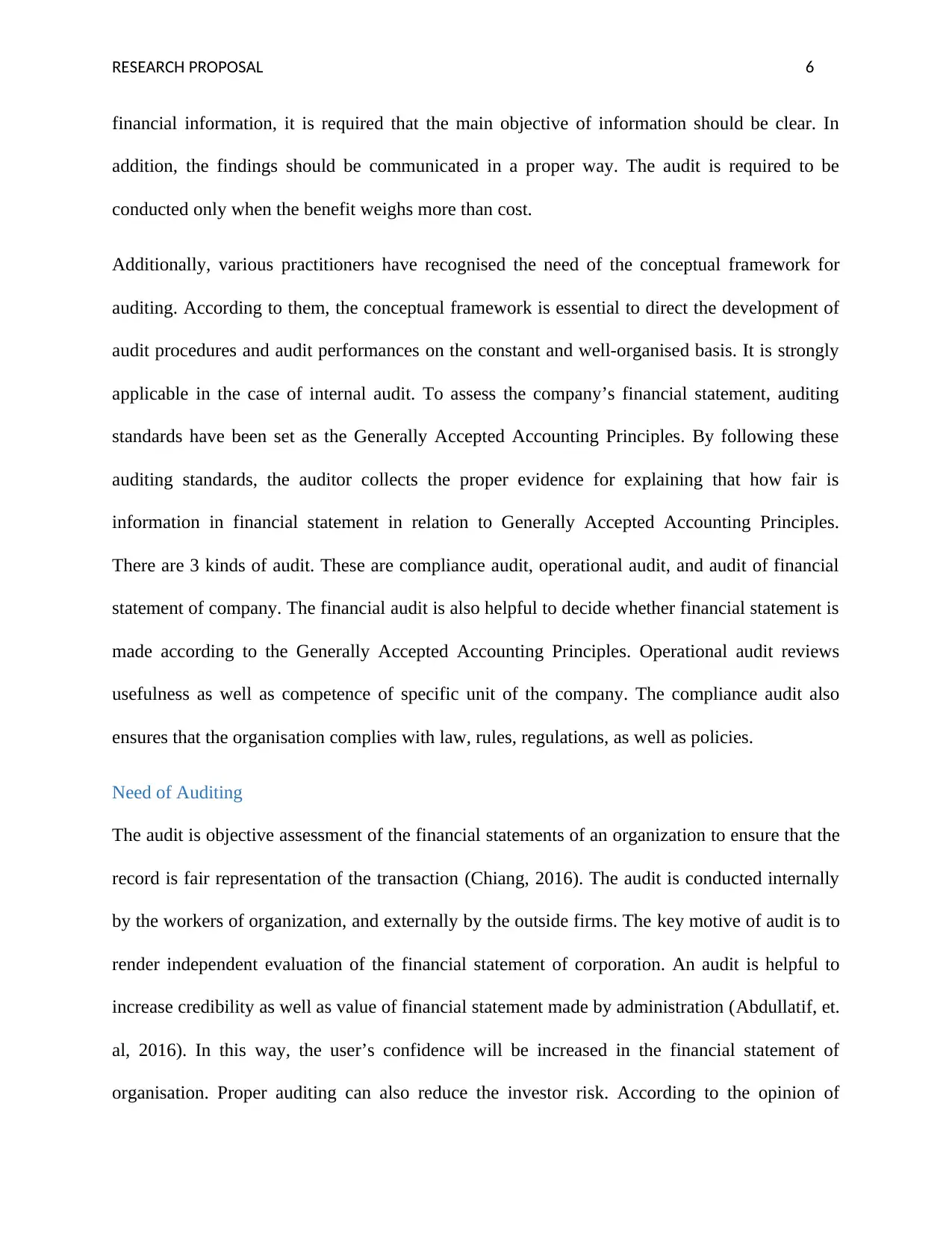
RESEARCH PROPOSAL 6
financial information, it is required that the main objective of information should be clear. In
addition, the findings should be communicated in a proper way. The audit is required to be
conducted only when the benefit weighs more than cost.
Additionally, various practitioners have recognised the need of the conceptual framework for
auditing. According to them, the conceptual framework is essential to direct the development of
audit procedures and audit performances on the constant and well-organised basis. It is strongly
applicable in the case of internal audit. To assess the company’s financial statement, auditing
standards have been set as the Generally Accepted Accounting Principles. By following these
auditing standards, the auditor collects the proper evidence for explaining that how fair is
information in financial statement in relation to Generally Accepted Accounting Principles.
There are 3 kinds of audit. These are compliance audit, operational audit, and audit of financial
statement of company. The financial audit is also helpful to decide whether financial statement is
made according to the Generally Accepted Accounting Principles. Operational audit reviews
usefulness as well as competence of specific unit of the company. The compliance audit also
ensures that the organisation complies with law, rules, regulations, as well as policies.
Need of Auditing
The audit is objective assessment of the financial statements of an organization to ensure that the
record is fair representation of the transaction (Chiang, 2016). The audit is conducted internally
by the workers of organization, and externally by the outside firms. The key motive of audit is to
render independent evaluation of the financial statement of corporation. An audit is helpful to
increase credibility as well as value of financial statement made by administration (Abdullatif, et.
al, 2016). In this way, the user’s confidence will be increased in the financial statement of
organisation. Proper auditing can also reduce the investor risk. According to the opinion of
financial information, it is required that the main objective of information should be clear. In
addition, the findings should be communicated in a proper way. The audit is required to be
conducted only when the benefit weighs more than cost.
Additionally, various practitioners have recognised the need of the conceptual framework for
auditing. According to them, the conceptual framework is essential to direct the development of
audit procedures and audit performances on the constant and well-organised basis. It is strongly
applicable in the case of internal audit. To assess the company’s financial statement, auditing
standards have been set as the Generally Accepted Accounting Principles. By following these
auditing standards, the auditor collects the proper evidence for explaining that how fair is
information in financial statement in relation to Generally Accepted Accounting Principles.
There are 3 kinds of audit. These are compliance audit, operational audit, and audit of financial
statement of company. The financial audit is also helpful to decide whether financial statement is
made according to the Generally Accepted Accounting Principles. Operational audit reviews
usefulness as well as competence of specific unit of the company. The compliance audit also
ensures that the organisation complies with law, rules, regulations, as well as policies.
Need of Auditing
The audit is objective assessment of the financial statements of an organization to ensure that the
record is fair representation of the transaction (Chiang, 2016). The audit is conducted internally
by the workers of organization, and externally by the outside firms. The key motive of audit is to
render independent evaluation of the financial statement of corporation. An audit is helpful to
increase credibility as well as value of financial statement made by administration (Abdullatif, et.
al, 2016). In this way, the user’s confidence will be increased in the financial statement of
organisation. Proper auditing can also reduce the investor risk. According to the opinion of
Paraphrase This Document
Need a fresh take? Get an instant paraphrase of this document with our AI Paraphraser
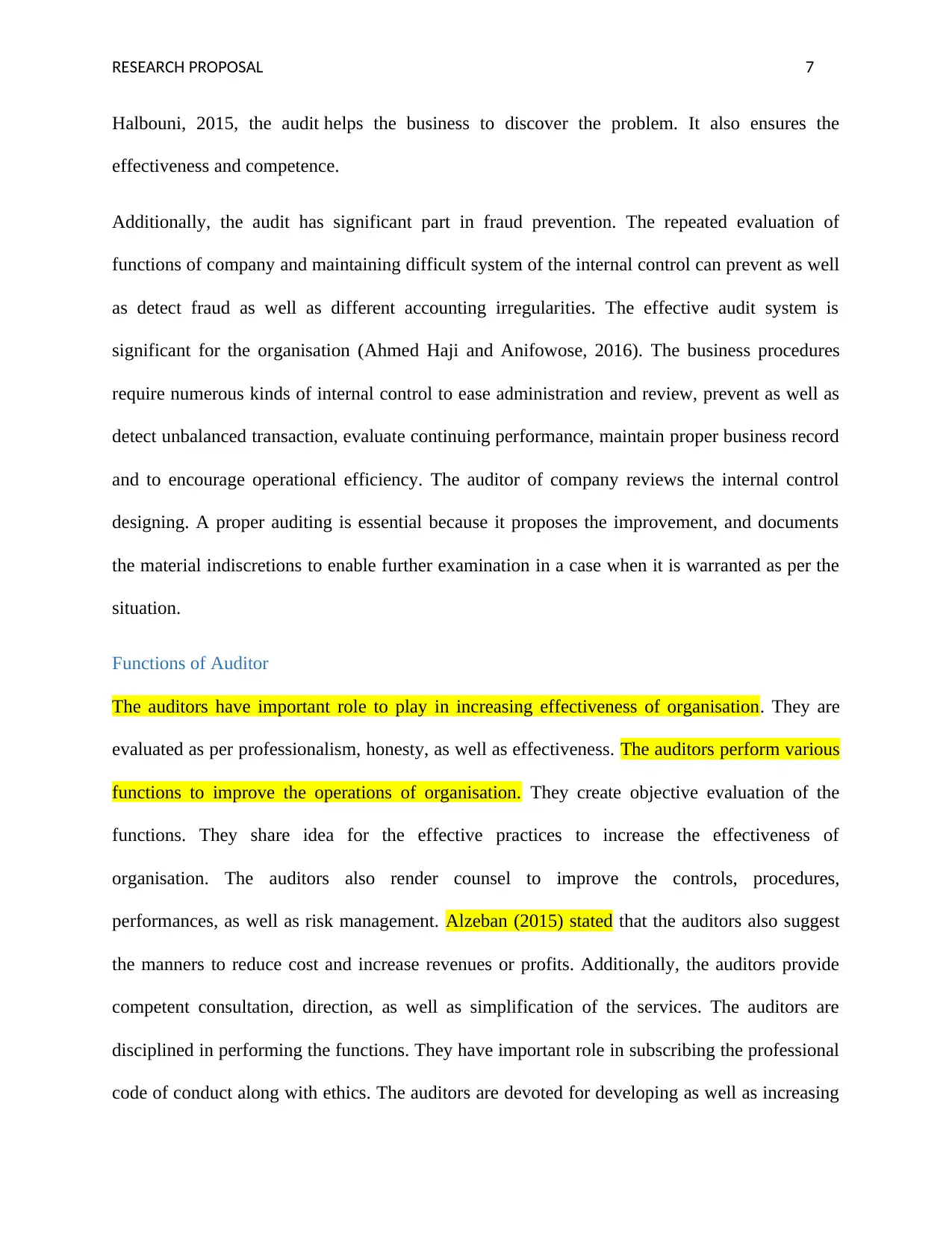
RESEARCH PROPOSAL 7
Halbouni, 2015, the audit helps the business to discover the problem. It also ensures the
effectiveness and competence.
Additionally, the audit has significant part in fraud prevention. The repeated evaluation of
functions of company and maintaining difficult system of the internal control can prevent as well
as detect fraud as well as different accounting irregularities. The effective audit system is
significant for the organisation (Ahmed Haji and Anifowose, 2016). The business procedures
require numerous kinds of internal control to ease administration and review, prevent as well as
detect unbalanced transaction, evaluate continuing performance, maintain proper business record
and to encourage operational efficiency. The auditor of company reviews the internal control
designing. A proper auditing is essential because it proposes the improvement, and documents
the material indiscretions to enable further examination in a case when it is warranted as per the
situation.
Functions of Auditor
The auditors have important role to play in increasing effectiveness of organisation. They are
evaluated as per professionalism, honesty, as well as effectiveness. The auditors perform various
functions to improve the operations of organisation. They create objective evaluation of the
functions. They share idea for the effective practices to increase the effectiveness of
organisation. The auditors also render counsel to improve the controls, procedures,
performances, as well as risk management. Alzeban (2015) stated that the auditors also suggest
the manners to reduce cost and increase revenues or profits. Additionally, the auditors provide
competent consultation, direction, as well as simplification of the services. The auditors are
disciplined in performing the functions. They have important role in subscribing the professional
code of conduct along with ethics. The auditors are devoted for developing as well as increasing
Halbouni, 2015, the audit helps the business to discover the problem. It also ensures the
effectiveness and competence.
Additionally, the audit has significant part in fraud prevention. The repeated evaluation of
functions of company and maintaining difficult system of the internal control can prevent as well
as detect fraud as well as different accounting irregularities. The effective audit system is
significant for the organisation (Ahmed Haji and Anifowose, 2016). The business procedures
require numerous kinds of internal control to ease administration and review, prevent as well as
detect unbalanced transaction, evaluate continuing performance, maintain proper business record
and to encourage operational efficiency. The auditor of company reviews the internal control
designing. A proper auditing is essential because it proposes the improvement, and documents
the material indiscretions to enable further examination in a case when it is warranted as per the
situation.
Functions of Auditor
The auditors have important role to play in increasing effectiveness of organisation. They are
evaluated as per professionalism, honesty, as well as effectiveness. The auditors perform various
functions to improve the operations of organisation. They create objective evaluation of the
functions. They share idea for the effective practices to increase the effectiveness of
organisation. The auditors also render counsel to improve the controls, procedures,
performances, as well as risk management. Alzeban (2015) stated that the auditors also suggest
the manners to reduce cost and increase revenues or profits. Additionally, the auditors provide
competent consultation, direction, as well as simplification of the services. The auditors are
disciplined in performing the functions. They have important role in subscribing the professional
code of conduct along with ethics. The auditors are devoted for developing as well as increasing
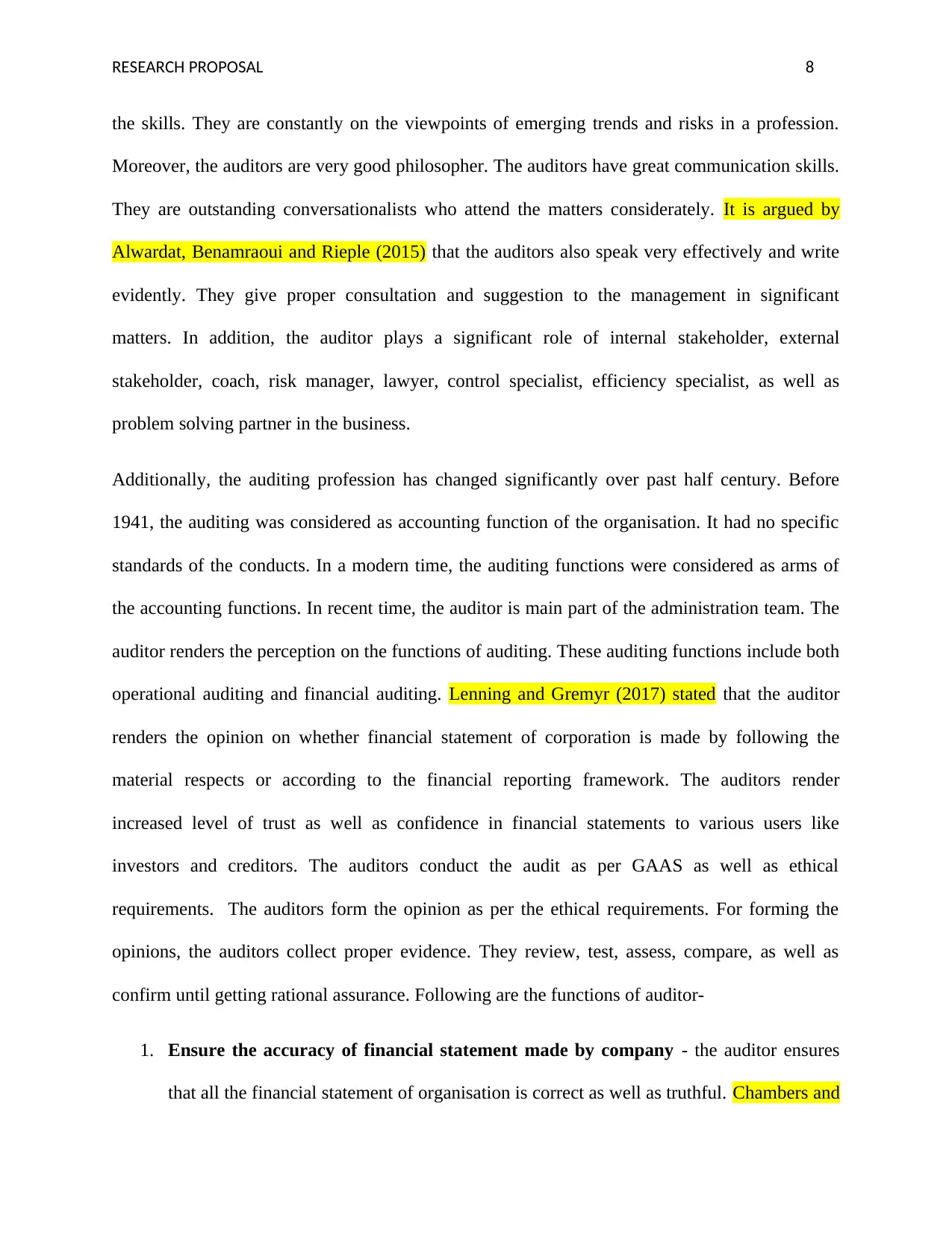
RESEARCH PROPOSAL 8
the skills. They are constantly on the viewpoints of emerging trends and risks in a profession.
Moreover, the auditors are very good philosopher. The auditors have great communication skills.
They are outstanding conversationalists who attend the matters considerately. It is argued by
Alwardat, Benamraoui and Rieple (2015) that the auditors also speak very effectively and write
evidently. They give proper consultation and suggestion to the management in significant
matters. In addition, the auditor plays a significant role of internal stakeholder, external
stakeholder, coach, risk manager, lawyer, control specialist, efficiency specialist, as well as
problem solving partner in the business.
Additionally, the auditing profession has changed significantly over past half century. Before
1941, the auditing was considered as accounting function of the organisation. It had no specific
standards of the conducts. In a modern time, the auditing functions were considered as arms of
the accounting functions. In recent time, the auditor is main part of the administration team. The
auditor renders the perception on the functions of auditing. These auditing functions include both
operational auditing and financial auditing. Lenning and Gremyr (2017) stated that the auditor
renders the opinion on whether financial statement of corporation is made by following the
material respects or according to the financial reporting framework. The auditors render
increased level of trust as well as confidence in financial statements to various users like
investors and creditors. The auditors conduct the audit as per GAAS as well as ethical
requirements. The auditors form the opinion as per the ethical requirements. For forming the
opinions, the auditors collect proper evidence. They review, test, assess, compare, as well as
confirm until getting rational assurance. Following are the functions of auditor-
1. Ensure the accuracy of financial statement made by company - the auditor ensures
that all the financial statement of organisation is correct as well as truthful. Chambers and
the skills. They are constantly on the viewpoints of emerging trends and risks in a profession.
Moreover, the auditors are very good philosopher. The auditors have great communication skills.
They are outstanding conversationalists who attend the matters considerately. It is argued by
Alwardat, Benamraoui and Rieple (2015) that the auditors also speak very effectively and write
evidently. They give proper consultation and suggestion to the management in significant
matters. In addition, the auditor plays a significant role of internal stakeholder, external
stakeholder, coach, risk manager, lawyer, control specialist, efficiency specialist, as well as
problem solving partner in the business.
Additionally, the auditing profession has changed significantly over past half century. Before
1941, the auditing was considered as accounting function of the organisation. It had no specific
standards of the conducts. In a modern time, the auditing functions were considered as arms of
the accounting functions. In recent time, the auditor is main part of the administration team. The
auditor renders the perception on the functions of auditing. These auditing functions include both
operational auditing and financial auditing. Lenning and Gremyr (2017) stated that the auditor
renders the opinion on whether financial statement of corporation is made by following the
material respects or according to the financial reporting framework. The auditors render
increased level of trust as well as confidence in financial statements to various users like
investors and creditors. The auditors conduct the audit as per GAAS as well as ethical
requirements. The auditors form the opinion as per the ethical requirements. For forming the
opinions, the auditors collect proper evidence. They review, test, assess, compare, as well as
confirm until getting rational assurance. Following are the functions of auditor-
1. Ensure the accuracy of financial statement made by company - the auditor ensures
that all the financial statement of organisation is correct as well as truthful. Chambers and
⊘ This is a preview!⊘
Do you want full access?
Subscribe today to unlock all pages.

Trusted by 1+ million students worldwide
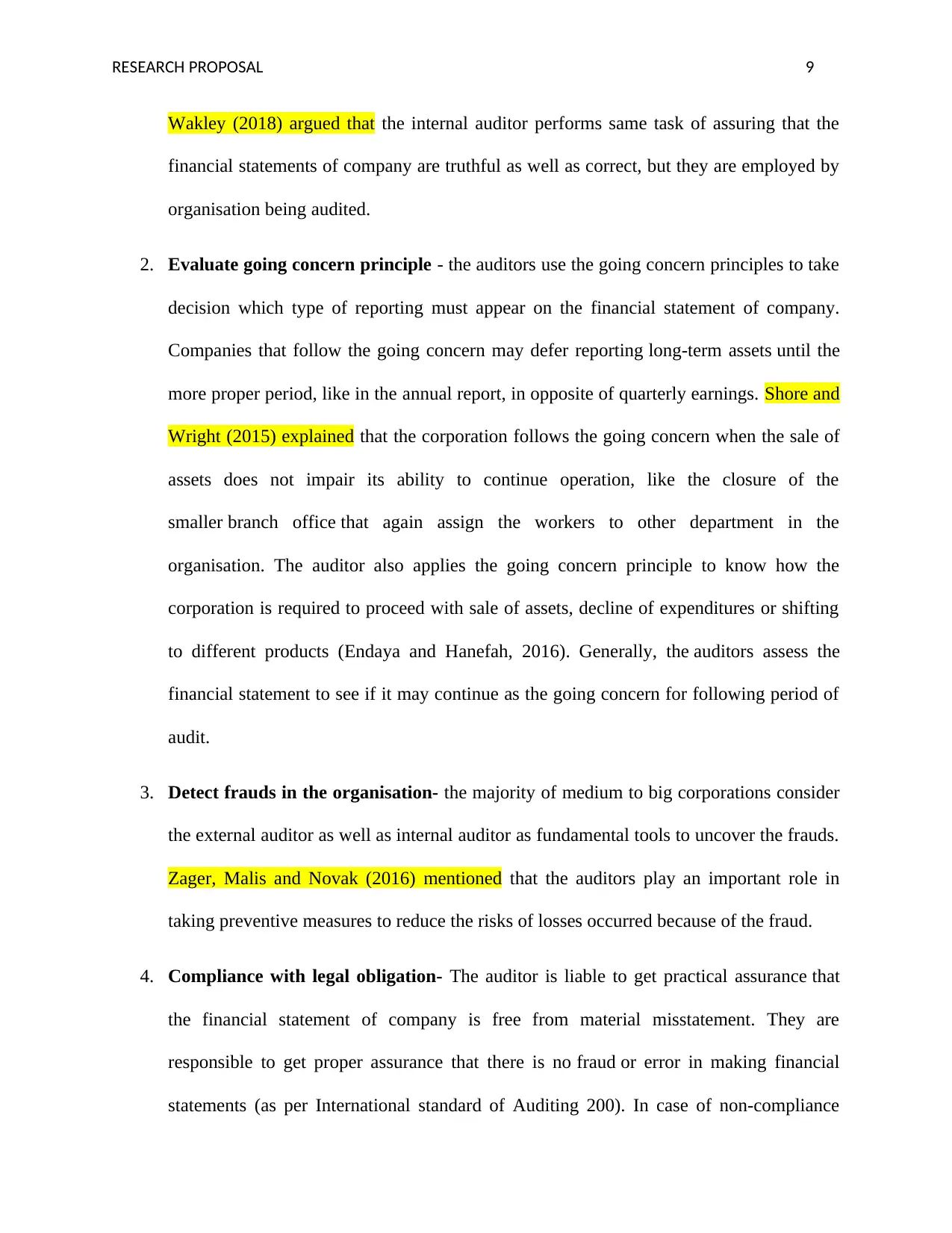
RESEARCH PROPOSAL 9
Wakley (2018) argued that the internal auditor performs same task of assuring that the
financial statements of company are truthful as well as correct, but they are employed by
organisation being audited.
2. Evaluate going concern principle - the auditors use the going concern principles to take
decision which type of reporting must appear on the financial statement of company.
Companies that follow the going concern may defer reporting long-term assets until the
more proper period, like in the annual report, in opposite of quarterly earnings. Shore and
Wright (2015) explained that the corporation follows the going concern when the sale of
assets does not impair its ability to continue operation, like the closure of the
smaller branch office that again assign the workers to other department in the
organisation. The auditor also applies the going concern principle to know how the
corporation is required to proceed with sale of assets, decline of expenditures or shifting
to different products (Endaya and Hanefah, 2016). Generally, the auditors assess the
financial statement to see if it may continue as the going concern for following period of
audit.
3. Detect frauds in the organisation- the majority of medium to big corporations consider
the external auditor as well as internal auditor as fundamental tools to uncover the frauds.
Zager, Malis and Novak (2016) mentioned that the auditors play an important role in
taking preventive measures to reduce the risks of losses occurred because of the fraud.
4. Compliance with legal obligation- The auditor is liable to get practical assurance that
the financial statement of company is free from material misstatement. They are
responsible to get proper assurance that there is no fraud or error in making financial
statements (as per International standard of Auditing 200). In case of non-compliance
Wakley (2018) argued that the internal auditor performs same task of assuring that the
financial statements of company are truthful as well as correct, but they are employed by
organisation being audited.
2. Evaluate going concern principle - the auditors use the going concern principles to take
decision which type of reporting must appear on the financial statement of company.
Companies that follow the going concern may defer reporting long-term assets until the
more proper period, like in the annual report, in opposite of quarterly earnings. Shore and
Wright (2015) explained that the corporation follows the going concern when the sale of
assets does not impair its ability to continue operation, like the closure of the
smaller branch office that again assign the workers to other department in the
organisation. The auditor also applies the going concern principle to know how the
corporation is required to proceed with sale of assets, decline of expenditures or shifting
to different products (Endaya and Hanefah, 2016). Generally, the auditors assess the
financial statement to see if it may continue as the going concern for following period of
audit.
3. Detect frauds in the organisation- the majority of medium to big corporations consider
the external auditor as well as internal auditor as fundamental tools to uncover the frauds.
Zager, Malis and Novak (2016) mentioned that the auditors play an important role in
taking preventive measures to reduce the risks of losses occurred because of the fraud.
4. Compliance with legal obligation- The auditor is liable to get practical assurance that
the financial statement of company is free from material misstatement. They are
responsible to get proper assurance that there is no fraud or error in making financial
statements (as per International standard of Auditing 200). In case of non-compliance
Paraphrase This Document
Need a fresh take? Get an instant paraphrase of this document with our AI Paraphraser
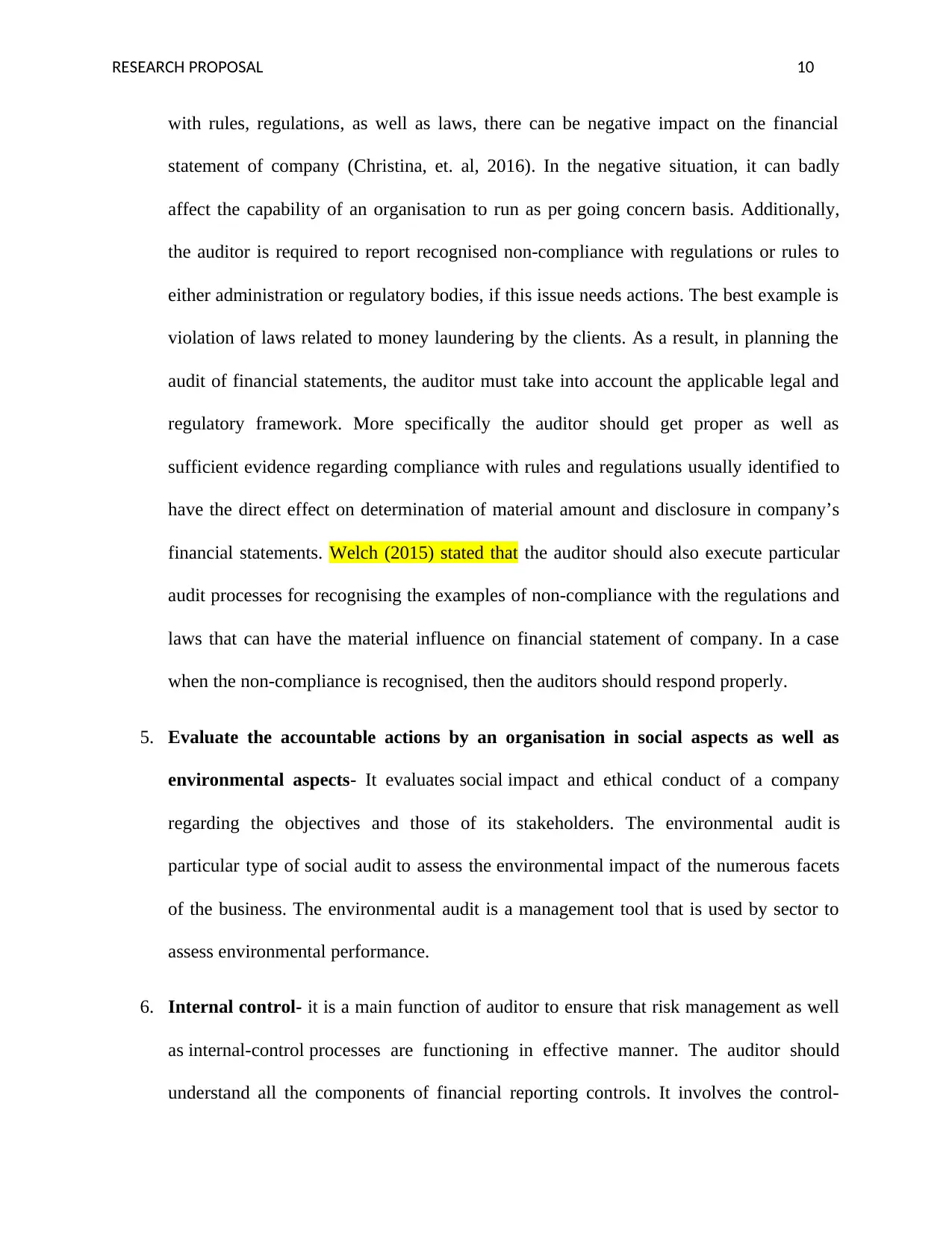
RESEARCH PROPOSAL 10
with rules, regulations, as well as laws, there can be negative impact on the financial
statement of company (Christina, et. al, 2016). In the negative situation, it can badly
affect the capability of an organisation to run as per going concern basis. Additionally,
the auditor is required to report recognised non-compliance with regulations or rules to
either administration or regulatory bodies, if this issue needs actions. The best example is
violation of laws related to money laundering by the clients. As a result, in planning the
audit of financial statements, the auditor must take into account the applicable legal and
regulatory framework. More specifically the auditor should get proper as well as
sufficient evidence regarding compliance with rules and regulations usually identified to
have the direct effect on determination of material amount and disclosure in company’s
financial statements. Welch (2015) stated that the auditor should also execute particular
audit processes for recognising the examples of non-compliance with the regulations and
laws that can have the material influence on financial statement of company. In a case
when the non-compliance is recognised, then the auditors should respond properly.
5. Evaluate the accountable actions by an organisation in social aspects as well as
environmental aspects- It evaluates social impact and ethical conduct of a company
regarding the objectives and those of its stakeholders. The environmental audit is
particular type of social audit to assess the environmental impact of the numerous facets
of the business. The environmental audit is a management tool that is used by sector to
assess environmental performance.
6. Internal control- it is a main function of auditor to ensure that risk management as well
as internal-control processes are functioning in effective manner. The auditor should
understand all the components of financial reporting controls. It involves the control-
with rules, regulations, as well as laws, there can be negative impact on the financial
statement of company (Christina, et. al, 2016). In the negative situation, it can badly
affect the capability of an organisation to run as per going concern basis. Additionally,
the auditor is required to report recognised non-compliance with regulations or rules to
either administration or regulatory bodies, if this issue needs actions. The best example is
violation of laws related to money laundering by the clients. As a result, in planning the
audit of financial statements, the auditor must take into account the applicable legal and
regulatory framework. More specifically the auditor should get proper as well as
sufficient evidence regarding compliance with rules and regulations usually identified to
have the direct effect on determination of material amount and disclosure in company’s
financial statements. Welch (2015) stated that the auditor should also execute particular
audit processes for recognising the examples of non-compliance with the regulations and
laws that can have the material influence on financial statement of company. In a case
when the non-compliance is recognised, then the auditors should respond properly.
5. Evaluate the accountable actions by an organisation in social aspects as well as
environmental aspects- It evaluates social impact and ethical conduct of a company
regarding the objectives and those of its stakeholders. The environmental audit is
particular type of social audit to assess the environmental impact of the numerous facets
of the business. The environmental audit is a management tool that is used by sector to
assess environmental performance.
6. Internal control- it is a main function of auditor to ensure that risk management as well
as internal-control processes are functioning in effective manner. The auditor should
understand all the components of financial reporting controls. It involves the control-
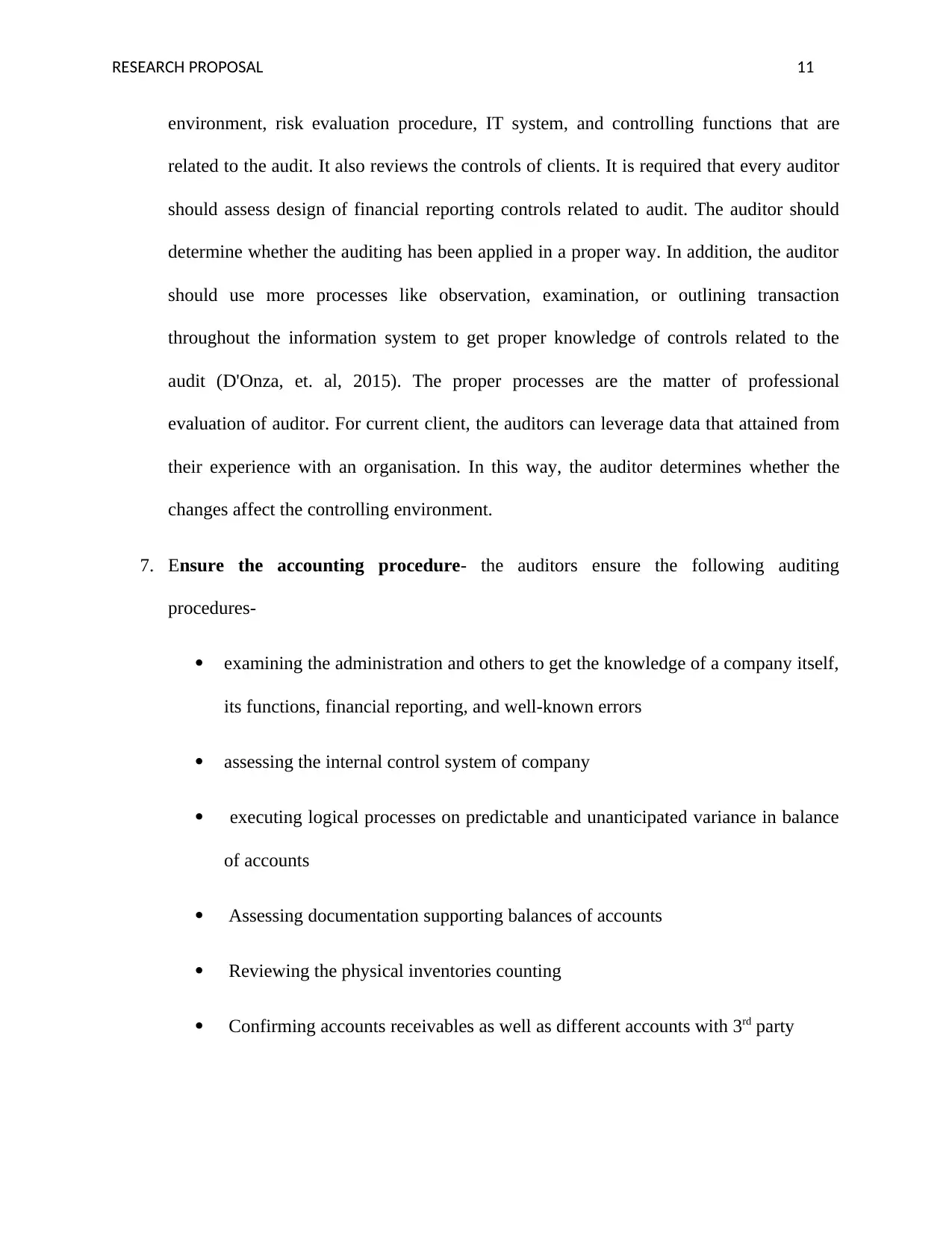
RESEARCH PROPOSAL 11
environment, risk evaluation procedure, IT system, and controlling functions that are
related to the audit. It also reviews the controls of clients. It is required that every auditor
should assess design of financial reporting controls related to audit. The auditor should
determine whether the auditing has been applied in a proper way. In addition, the auditor
should use more processes like observation, examination, or outlining transaction
throughout the information system to get proper knowledge of controls related to the
audit (D'Onza, et. al, 2015). The proper processes are the matter of professional
evaluation of auditor. For current client, the auditors can leverage data that attained from
their experience with an organisation. In this way, the auditor determines whether the
changes affect the controlling environment.
7. Ensure the accounting procedure- the auditors ensure the following auditing
procedures-
examining the administration and others to get the knowledge of a company itself,
its functions, financial reporting, and well-known errors
assessing the internal control system of company
executing logical processes on predictable and unanticipated variance in balance
of accounts
Assessing documentation supporting balances of accounts
Reviewing the physical inventories counting
Confirming accounts receivables as well as different accounts with 3rd party
environment, risk evaluation procedure, IT system, and controlling functions that are
related to the audit. It also reviews the controls of clients. It is required that every auditor
should assess design of financial reporting controls related to audit. The auditor should
determine whether the auditing has been applied in a proper way. In addition, the auditor
should use more processes like observation, examination, or outlining transaction
throughout the information system to get proper knowledge of controls related to the
audit (D'Onza, et. al, 2015). The proper processes are the matter of professional
evaluation of auditor. For current client, the auditors can leverage data that attained from
their experience with an organisation. In this way, the auditor determines whether the
changes affect the controlling environment.
7. Ensure the accounting procedure- the auditors ensure the following auditing
procedures-
examining the administration and others to get the knowledge of a company itself,
its functions, financial reporting, and well-known errors
assessing the internal control system of company
executing logical processes on predictable and unanticipated variance in balance
of accounts
Assessing documentation supporting balances of accounts
Reviewing the physical inventories counting
Confirming accounts receivables as well as different accounts with 3rd party
⊘ This is a preview!⊘
Do you want full access?
Subscribe today to unlock all pages.

Trusted by 1+ million students worldwide
1 out of 41
Related Documents
Your All-in-One AI-Powered Toolkit for Academic Success.
+13062052269
info@desklib.com
Available 24*7 on WhatsApp / Email
![[object Object]](/_next/static/media/star-bottom.7253800d.svg)
Unlock your academic potential
Copyright © 2020–2026 A2Z Services. All Rights Reserved. Developed and managed by ZUCOL.





